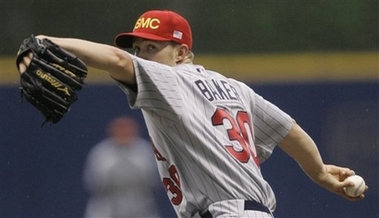May 20, 2007
Everyone, Meet Scott Baker
IP H R ER BB SO HR PIT
8.1 6 2 2 0 4 2 96
He pounded the strike zone, throwing 74 percent of his offerings for strikes, handing out zero walks, and recording 25 outs on 96 pitches. Baker certainly wasn't dominant, but it was the sort of outing that shows why the Twins turned to him as Ponson's replacement, rather than go with Garza or Slowey. Of course, it was also the sort of outing that shows why trusting young pitchers like Baker was a better idea than messing around with Ponson or Ramon Ortiz in the first place.
 Judging from the comments left here and the e-mails I've received on the subject, it's clear that Baker's performance last season convinced a huge percentage of Twins fans that he'll never be a good major-league pitcher. In fact, I'm not sure that I've ever seen a fan base turn so quickly and strongly on a young player based on one bad half season. I've been relatively steadfast in my support of Baker and, while it was just one game, Saturday's start against the Brewers showed why: Baker can pitch.
Judging from the comments left here and the e-mails I've received on the subject, it's clear that Baker's performance last season convinced a huge percentage of Twins fans that he'll never be a good major-league pitcher. In fact, I'm not sure that I've ever seen a fan base turn so quickly and strongly on a young player based on one bad half season. I've been relatively steadfast in my support of Baker and, while it was just one game, Saturday's start against the Brewers showed why: Baker can pitch.
When he's going well, Baker throws strikes, changes speeds, attacks hitters with a diverse arsenal of pitches, and misses a fair number of bats in the process. However, while he was at his best Saturday against a strong lineup, Baker's faults were also on display if you looked hard enough. Both Milwaukee runs came on solo homers, with J.J. Hardy taking Baker deep two batters into the game and Bill Hall homering in the ninth inning.
Hall's homer caused Ron Gardenhire to pull Baker two outs away from a complete game despite the fact that the Twins were still up three runs with no one on base and Baker was still four pitches short of the century mark. When Gardenhire brought Joe Nathan in to replace Baker, Dick Bremer and Bert Blyleven repeatedly told the television audience that it was a save situation. It wasn't. Because Nathan didn't start the inning, the tying run would have to have been on deck for a save to be in play.
With no one on base when Baker exited up 5-2, that wasn't the case. However, I'm not bringing up Nathan's non-save to criticize Bremer and Blyleven (although it certainly seems like something a pair of baseball announcers should know). Instead, my point is that Gardenhire yanked Baker with no real danger present. The bases were empty, his pitch count was low, and he needed to record two outs without allowing three runs to score.
Pulling Baker on the verge of a complete game isn't a particularly big deal either way (although it's silly if a "save" was behind it in any way), but it shows that perhaps Gardenhire perceives him as a pitcher who can implode quickly. And in a way, he's right. Baker's 11 ground-ball outs were a career-high and just the second time he's reached double digits, yet he still served up two homers and two doubles, and saw several hard-hit balls find gloves among his seven fly-ball outs.
As one of the most extreme fly-ball pitchers in baseball, Baker is more susceptible than most to a big inning sidetracking an otherwise strong outing. When a ground-ball pitcher is cruising along and leading by three runs, it takes a string of hits to get him in trouble. When a fly-ball pitcher is cruising along and leading by three runs, it takes two baserunners to put a serious game-tying threat in play. None of that takes away from Baker's start, but it's important as he goes forward in the rotation.
Baker's outing showed why he deserved another chance, but it also showed why he'll likely always be walking a relatively thin line as a quality middle-of-the-rotation starter. After Saturday's start, Baker now sports a 5.02 ERA and 99-to-30 strikeout-to-walk ratio in 145 career innings. Those are decent enough numbers through the first 26 starts of a young pitcher's career, but the homers he allows (24 so far over that span) will go a long way toward determining whether he can bring that ERA closer to 4.00.
Once you're done here, check out my latest "Daily Dose" column over at Rotoworld.

